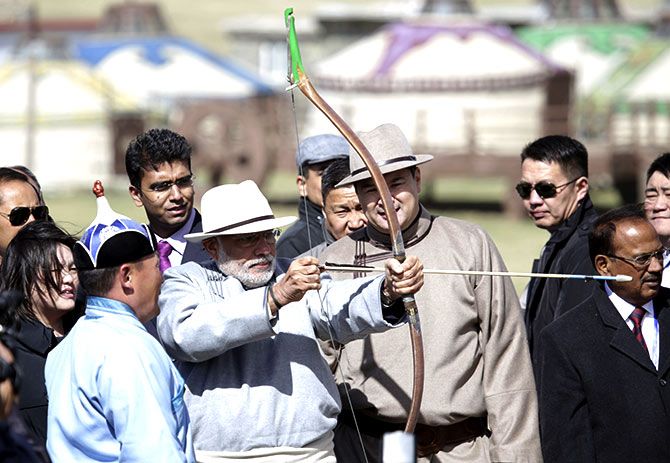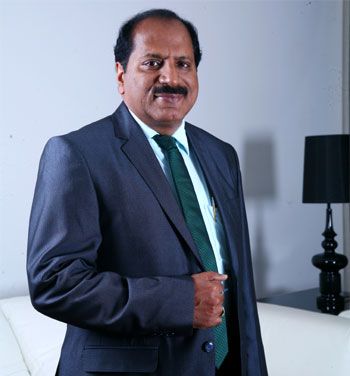'If Make in India has to be a reality, the land acquisition bill is needed to smoothen the process and, in my opinion, the bill is pro-farmer!'
'If you look at developed countries, all political parties agree on the economic agenda and development of the country. They don’t play politics with economics'

The biggest achievement of the Modi government in the past one year was it could bring positivity in the minds of the people and industry, says V P Nandakumar (bottom, left), executive chairman of the Manappuram Finance Ltd, in an interview to Shobha Warrier/Rediff.com.
The company that started off as a small pawn shop in 1949, today has 3,293 branches across 25 states in India with nearly 16,000 employees.
The total income of the company for fiscal year 2014-15 was Rs 1,986.42 crore (Rs 19.86 billion).
In this interview over phone from Kerala, Nandakumar speaks to Shobha Warrier on the first 365 days of the Narendra Modi government.
Expectations were very high when Narendra Modi became the prime minister. How would you rate him?
After the policy paralysis that happened during UPA 2, after the confusion over who the leader was during that period, Modi entered the scene as a leader with lot of charisma. With Modi projecting himself as the man to clean up the mess, people got the impression that he has a magic wand. That was not his fault. Because of all these, expectations were very high.
It is not possible for anyone to deliver so much in such a short span.
 Personally, I expect him to deliver what the country needs in three-four years and not in one year. Like we have to take the bitter kashayam (Ayurvedic medicine) to get cured of many diseases, the prime minister will have to take some tough decisions too. When you take difficult decisions, there will be political turmoil -- for example, the land acquisition bill. If Make in India has to be a reality, the bill is needed to smoothen the process.
Personally, I expect him to deliver what the country needs in three-four years and not in one year. Like we have to take the bitter kashayam (Ayurvedic medicine) to get cured of many diseases, the prime minister will have to take some tough decisions too. When you take difficult decisions, there will be political turmoil -- for example, the land acquisition bill. If Make in India has to be a reality, the bill is needed to smoothen the process.
The bill with the new amendments has been labelled as anti-farmer…
In my opinion, the bill is pro-farmer! By calling it anti-farmer, opposition parties were able to misguide the farmers, and they also believed without understanding what exactly it is.
There are many areas in India where agriculture has become unviable, and the farmers of those areas are suffering. When agricultural sector is not doing well, such areas should be developed for the manufacturing sector. Since farmers have anyway not been able to till the land, by promoting industry, at least you are giving good compensation to the starving family and also employment to the youth of the area.
Critics describe the Modi government as pro-corporate and anti-poor.
I don’t agree at all. This is the propaganda unleashed by the opposition parties who cannot fathom the idea of this man coming to power with such a massive mandate.
Take, for example, the Make in India campaign. It is not to help the corporates but to generate employment. To start any industry, you need capital. From where will the capital come? A major chunk of it will come through foreign direct investment and for that to come you need to create infrastructure, usher in labour reforms and have a good business environment. This is what is labelled as pro-industry and pro-corporate. But ultimately, who is going to benefit from this? The poor and the unemployed. It is easy to make allegations.
Do you think the atmosphere in India is conducive for investment? Though Finance Minister Arun Jaitley says policies are in place, investment is not coming in.
India is not investment-friendly yet. More has to be done to make it investment-friendly. Just policies are not enough; the government has to take the people along too. Otherwise, it is not easy to make the country investment-friendly. If you look at the developed countries, all political parties agree on the economic agenda and the development of the country. They don’t play politics with economics. But that is not the case here. The ruling party of today behaved exactly the same way when they were in the opposition.
I feel Modi tried his level best to take the country forward but because it doesn’t have a majority in the Upper House, nothing is moving.
As a businessman, do you think the economic policies of the Modi government are in the right direction?
Not only me, industry bodies like the CII, ASSOCHAM, FICCI, are of the opinion that the Modi government is moving in the right direction. We will start seeing results in the next three years if Modi is allowed to have his way, and we will see the results benefitting all sections of people.
How do you look at the gold deposit scheme started by the government wherein you can deposit gold in the bank for tax-free interest? Will it affect people like you who give loan against gold?
I don’t think it will affect the gold loan industry. Gold loans are used mostly by those who belong to the bottom of the pyramid whereas those likely to make use of the proposed gold monetisation scheme are people who possess gold held in bank lockers, in other words, who have kept their gold idle. The idea is that gold that otherwise remains a dead investment will now come into circulation and contribute to economic growth.
In this context, we believe the government should also allow Non-banking Finance Corporations to become a part of this quest because we have a far greater reach among consumers, especially in the un-banked areas. If NBFCs are also included in the process, it can be a game changer.
Moreover, the government should encourage the gold loan business in the organised sector as this activity contributes directly to the monetisation of gold. They should consider restoring the priority sector status to gold loans by NBFCs, which was in fact the position till February 2011. This will reduce our borrowing cost and make it feasible to lend against gold jewellery at a lower rate of interest. And this will also contribute to the monetisation of gold…I mean the idea of monetisation can happen this way too.
You mean, gold that remains as dead investment will come out in the market?
Yes, it will come out in the market and will be a part of the economy. The gold import today is 1,000 tonnes and if they can generate at least 500 tonnes through the scheme, it will be a big boost to the economy.
Do you see achche din coming?
Yes, but it may take three-four years for achche din to come. The mind-set of the people also has to change and it will only happen slowly.
The biggest achievement of the government in the last one year was it could bring positivity in the minds of the people and industry. It could take the industry into confidence as industry is the main driver of the economy by creating employment and growth.









